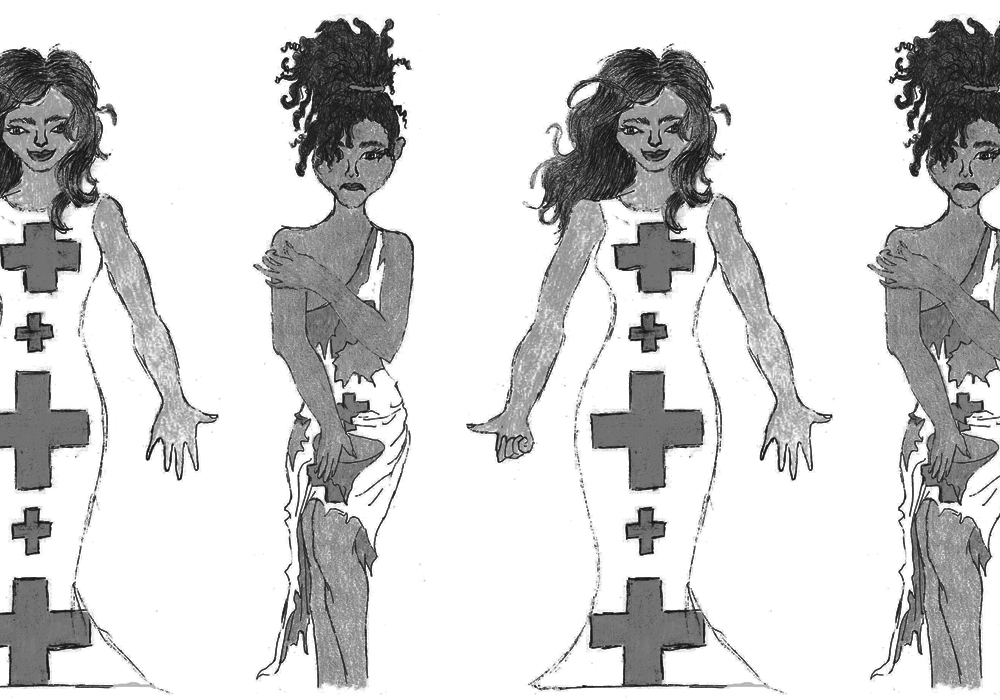Kanchi Uttamchandani, Staff Writer
Featured illustration by Bernice Afriyie
Multiculturalism may be one of Canada’s most celebrated values, but Canada is far from being free of systemic racism and discrimination. Some minority communities face differential treatment even when it comes to something as essential as health care.
In 1971, the Canadian government implemented a formal policy on multiculturalism with a mandate to support the cultural development of ethnocultural groups and to help their members overcome barriers to fully participate in Canadian society.
While the policy is well-intentioned, it can be argued that it fails to acknowledge systemic issues of racism, white privilege, and xenophobia, and instead it reinforces social inequalities and divisiveness through its perfunctory approach.
Examples attest that multiculturalism is nothing more than a misleading term to mask over the conflicts prevalent within minority and racialized communities such as black communities, Tamil communities, Aboriginal communities, and so on.
For instance, Tamils are a visible minority who claimed refugee status upon their arrival in Canada, yet they face discrimination on multiple counts of colour, ethnicity, and suspected terrorist connections, which potentially impede their access to health care services, particularly mental health services.
“An influx of Tamil refugees came to Canada between 2009 and 2010, during the peak of the genocide of Tamils in the northeast of Sri Lanka,” says Roshni Raveenthiran, VP equity for United South Asians at York and a member of the York University Tamil Student Association.
“In 2015, many Tamils still identified as refugees, living with many disadvantages here on Canadian soil. Mental health in the Tamil community is often silenced and stigmatized due to the idea of shame and honour that plays a key role in our community. For Tamils who fled the war, post-traumatic stress disorder, anxiety, and depression are just some of the many mental health problems they struggle with.”
When it comes to health care, Canada offers differential and discriminatory treatment towards Tamil refugees.
“Mental health services for Tamil communities are limited due to a lack of Tamil-speaking mental health aid workers and a lack of funding,” says Raveenthiran.
“The existing high number of white mental health aid workers does not create a safe space for Tamil refugees who have experienced the stressors of displacement, shelling, and sexual violence. To compound the problem, Tamils living in Canada now have a ‘terrorist’ label as their identifier due to their affiliations with The Liberation Tigers of Tamil Eelam, which was deemed a terrorist organization in Canada,” she adds.
While the Canadian government openly welcomed a massive influx of Syrian refugees, they have largely disregarded Tamil refugees, which highlights underlying patterns of power and privilege that manifest even in the health care system. It also raises questions about how the particular needs of the Syrian refugees will be addressed, especially in the field of health care.
“Mental health services in Toronto continue to have existing language and logistics barriers as many health care service providers are not Tamil or Tamil-speaking, which puts seniors and women at a distinct disadvantage,” says Raveenthiran. “Documentation, applications, and the dialogue around the problems patients have are not communicated properly, which often leads to a lack of required resources and misdiagnosis.”
Canada is yet to have a health care system that takes into account ethno-racial equity and recognizes the social determinants of immigrant health, such as social isolation. The health care system also needs to take into account the socio-economic factors that impact how immigrants access education, housing, and employment, which in turn have a profound bearing on one’s health status.
There is also a need for the provision of culturally and linguistically appropriate services to a burgeoning and diverse clientele base. Taking these steps will demonstrate a real commitment to multiculturalism.
Like us on Facebook, @excalweb



horrible article.
rubbish